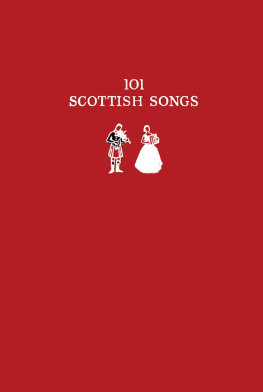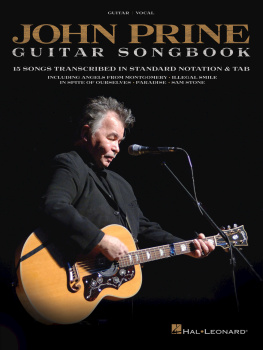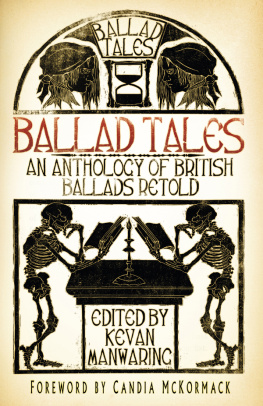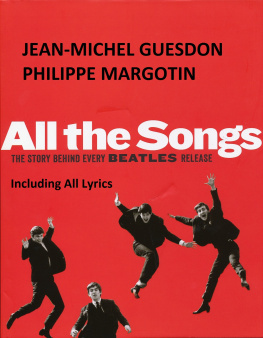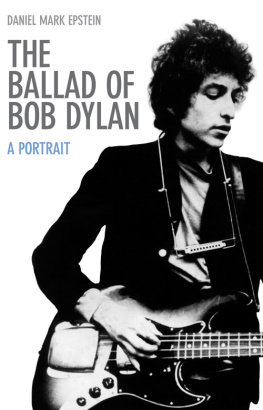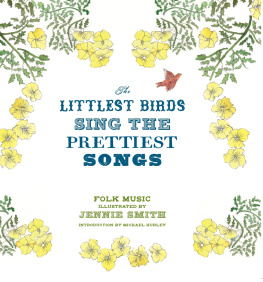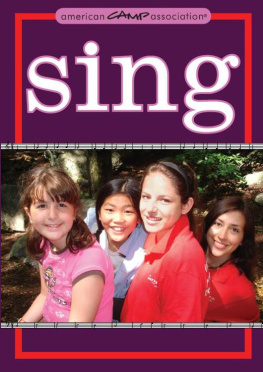John A. Lomax - American Ballads and Folk Songs
Here you can read online John A. Lomax - American Ballads and Folk Songs full text of the book (entire story) in english for free. Download pdf and epub, get meaning, cover and reviews about this ebook. year: 1994, publisher: Dover Publications, genre: Detective and thriller. Description of the work, (preface) as well as reviews are available. Best literature library LitArk.com created for fans of good reading and offers a wide selection of genres:
Romance novel
Science fiction
Adventure
Detective
Science
History
Home and family
Prose
Art
Politics
Computer
Non-fiction
Religion
Business
Children
Humor
Choose a favorite category and find really read worthwhile books. Enjoy immersion in the world of imagination, feel the emotions of the characters or learn something new for yourself, make an fascinating discovery.
- Book:American Ballads and Folk Songs
- Author:
- Publisher:Dover Publications
- Genre:
- Year:1994
- Rating:5 / 5
- Favourites:Add to favourites
- Your mark:
- 100
- 1
- 2
- 3
- 4
- 5
American Ballads and Folk Songs: summary, description and annotation
We offer to read an annotation, description, summary or preface (depends on what the author of the book "American Ballads and Folk Songs" wrote himself). If you haven't found the necessary information about the book — write in the comments, we will try to find it.
American Ballads and Folk Songs — read online for free the complete book (whole text) full work
Below is the text of the book, divided by pages. System saving the place of the last page read, allows you to conveniently read the book "American Ballads and Folk Songs" online for free, without having to search again every time where you left off. Put a bookmark, and you can go to the page where you finished reading at any time.
Font size:
Interval:
Bookmark:
AMERICAN BALLADS
AND FOLK SONGS JOHN A. LOMAX
AND
ALAN LOMAX With a Foreword by George Lyman Kittredge DOVER PUBLICATIONS, INC.
New York Bibliographical Note This Dover edition, first published in 1994, is an unabridged and unaltered republication of the work originally published by The Macmillan Company, New York, in 1934. Library of Congress Cataloging-in-Publication Data American ballads and folk songs / John A. Lomax and Alan Lomax; with a foreword by George Lyman Kittredge. p.cm. melodies. melodies.
Originally published: New York: Macmillan, 1934. Includes bibliographical references (p. ) and index. ISBN 0-486-28276-7 (pbk.) 1. Ballads, EnglishUnited States. 2.
Folk songs, EnglishUnited States. 3. Afro-AmericansMusic. 4. Folk musicUnited States. I.
Lomax, John Avery, 18671948. II. Lomax, Alan, 1915 . III. Kittredge, George Lyman, 18601941. M1629.A4771994 94-17510 CIP M Manufactured in the United States by Courier Corporation
28276708
www.doverpublications.com To the Mother who sang many of these songs into the lives of Shirley, John, Jr., Alan, and Bess Brown, in grateful and loving memory, we dedicate this book.
Ef anybody axes you Who wuz it writ dis song, Tell him twuz a dark-skinned nigger Wid a pair o blue duckins on, A-lookin for a home, Jes a-lookin for a home. From De Ballit of de Boll Weevil. ***** Oh, twas a long and a tiresome go, Our herd rolled on to Mexico; With music sweet of the cowboy song, For New Mexico we rolled along. ***** Its a pity that Satan should have all the best tunes. J OHN W ESLEY FOREWORD P ROFESSOR L OMAX needs no introduction. His Cowboy Songs, published years and years ago, won forthwith a classic rank among books of folk-poetryin whatever sense controversialists may choose to interpret that much-vexed term. But, though introduction is superfluous, a word of greeting may not be out of place.
Lomax has never flagged in his zeal as a collector, and his success has been proportionate with his energy. Of late, too, he has enjoyed the assistance of his son, and their combined activities have greatly increased our knowledge of the subject. In the volume now offered to the friendly reader there is much that is novel; yet the old familiar fields are not neglected. Here, then, is a book of songs that illustrates many phases of our strangely multifarious life and manners. There is something for every mood and for every intelligent taste. Caveat emptor is a good book-buying motto nowadays, but in this case the buyer may take his chances without trepidation. G. L. L.
K ITTREDGE ACKNOWLEDGMENT W HEN I went first to college in Texas I carried in my trunk, along with my pistol and other implements of personal warfare, a little manuscript roll of cowboy songs. My fathers farm and small ranch was located on the Chisholm Trail, over which many thousand Longhorn cattle were driven to Dodge City, Kansas; sometimes on to Montana and the Dakotas. Especially at night when lying awake, I had heard the cowboys sing to the cattle bedded down near our home. These songs and others like them were also current among a number of neighbor boys, older than myself, who each spring went on the round-up and afterwards trailed a herd of cattle to a Northern market. They brought new songs back with them for the entertainment of their friends. On one occasion I exhibited my store of cowboy songs to a somewhat startled Texas English professor.
I was told politely that they had no value. So I put them away until I became, years afterwards, a student in Harvard. There, during a course in American literature taught by Professor Barrett Wendell, I was encouraged to believe that the songs were worth preserving. In order to aid my work in collecting, he and Professor George Lyman Kittredge sent out to many newspapers of the country a letter asking that all types of folk songs be forwarded to me. Later on, after I had been appointed a Traveling Sheldon Fellow to investigate American folk songs, Professors Wendell and Kittredge were joined in a second appeal to the public by Dean L. R. R.
Briggs and Professor Fred N. Robinson. Such sponsorship resulted, during the three years I held the Sheldon fellowship, in the accumulation of a great mass of material. Two books of cowboy songs were issued from material secured principally in Texas, Oklahoma, New Mexico, Arizona, Colorado, Wyoming, and other states where I visited and recorded tunes in saloons and on remote ranches. Several thousand pages of unused manuscript were filed away. The present book is a direct outgrowth of the collection which was then made under Harvard patronage.
Whatever its fortune, it goes to a public whose interest in folk material is much greater than in 1910, when Cowboy Songs was published. At that time no publisher would print the cowboy song music, except a few illustrative examples. Records of this music had been made on wax cylinders, which, alas! have crumbled with age. However, the music then set down and printed, long unnoticed, is now often heard over the radio. It has been said that the song Home on the Range was the most popular tune of the first half of 1933. The music for that song was obtained twenty-three years ago from the Negro proprietor of a low drinking and gambling dive in the slum district of San Antonio.
It remained safely buried in Cowboy Songs for nearly a quarter of a century. The publication of this volume is, therefore, largely due to the unflagging interest of two men. So long as Professor Barrett Wendell lived, he gave my work his cordial support, and through the resulting association I, in turn, gave him my everlasting affection. To me, as well as to all who collect folk songs, or who write of this literature, Professor Kittredge is ready with advice, help, and, when needed, forceful admonition. These words are set down in grateful recognition and appreciation. Many other people have helped to make this book possible.
Entitled perhaps to first mention is Miss Mary Gresham, a competent musician and teacher of Washington, who transcribed from aluminum, wax, and celluloid records made this summer much of the Negro music in this book, and, in addition, other songs from singing and from rough manuscript notation. Edward Neighbors Waters, Assistant in the Music Division, Library of Congress, wrote out the music for approximately fifty songs, principally from singing. Other members of the Music Division, notably Carl Engel, its Chief, Oliver Strunk, Assistant Chief, and Frank Megill, Assistant, were constantly courteous and helpful. None of the faults of the book or responsibilities growing out of it, however, are chargeable to these persons. To Mrs. Janice Reed Lit of Haverford, Pennsylvania, whose helpfulness in many ways has been constant since the book was first definitely planned; to Professors Howard W.
Odum, Guy Johnson, and A. P. Hudson, all of the University of North Carolina, that is, along with near-by Duke University, the folk song collecting center of the South; to Professor Arthur G. Brodeur of the University of California; to Professor Joseph W. Clokey of Pomona College; to Frank Dobie of the University of Texas; to Professor E. C.
Beck, Central State Teachers College, Mt. Pleasant, Michigan; to Louise and Cletus Oakley of Brown University; to Professor Lucy Lockwood Hazard of Mills College; to Slim Critchlow, Forest Ranger and soloist for the Utah Buckaroos; to Dean L. B. R. Briggs of Harvard University; to Professors Josiah Combs and Newton Gaines of Texas Christian University; to Professor George E. Hastings of the University of Arkansas; to Sigmund Spaeth, New York City; to Professor George Pullen Jackson, Vanderbilt University; to Sam P.
Bayard, State College, Pennsylvania; to Mr. H. H. Fuson, Harlan, Kentucky; to Mr. and Mrs. Oscar Callaway, Comanche, Texas; to Carl Sandburg, Harbert, Michigan; to Professor and Mrs.
Next pageFont size:
Interval:
Bookmark:
Similar books «American Ballads and Folk Songs»
Look at similar books to American Ballads and Folk Songs. We have selected literature similar in name and meaning in the hope of providing readers with more options to find new, interesting, not yet read works.
Discussion, reviews of the book American Ballads and Folk Songs and just readers' own opinions. Leave your comments, write what you think about the work, its meaning or the main characters. Specify what exactly you liked and what you didn't like, and why you think so.

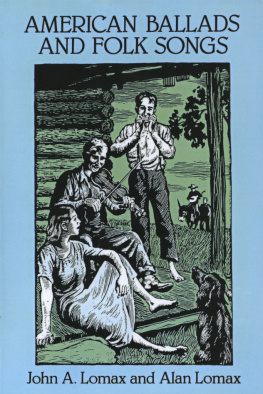
![Robert Choi - Korean Folk Songs: Stars in the Sky and Dreams in Our Hearts [14 Sing Along Songs with the Downloadable Audio included]](/uploads/posts/book/423508/thumbs/robert-choi-korean-folk-songs-stars-in-the-sky.jpg)
